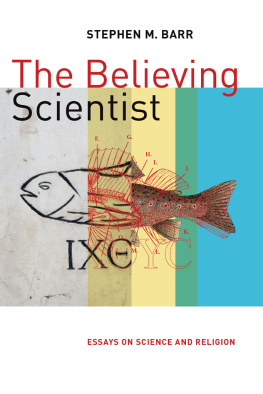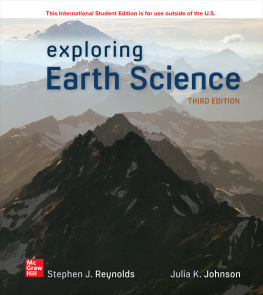EARLY BIRD BOOKS
FRESH EBOOK DEALS, DELIVERED DAILY
LOVE TO READ ?
LOVE GREAT SALES ?
GET FANTASTIC DEALS ON BESTSELLING EBOOKS
DELIVERED TO YOUR INBOX EVERY DAY!
THE PRESTON A. WELLS JR. GUIDES TO THE MAJOR DISCIPLINES
GENERAL EDITOR
JEFFREY O. NELSON
EDITOR
JEREMY BEER
PHILOSOPHY Ralph M. McInerny
LITERATURE R. V. Young
LIBERAL LEARNING James V. Schall, S.J.
THE STUDY OF HISTORY John Lukacs
THE CORE CURRICULUM Mark C. Henrie
U.S. HISTORY Wilfred M. McClay
ECONOMICS Paul Heyne
POLITICAL PHILOSOPHY Harvey C. Mansfield
PSYCHOLOGY Daniel N. Robinson
CLASSICS Bruce S. Thornton
AMERICAN POLITICAL THOUGHT George W. Carey
RELIGIOUS STUDIES D. G. Hart
THE STUDY OF LAW Gerard V. Bradley

A Students Guide to Natural Science
STEPHEN M. BARR

W ILMINGTON , D ELAWARE
INTRODUCTION
THE NATURAL SCIENCES include physics, astronomy, geology, chemistry, and biology, and are usually referred to as such in contradistinction to the human sciences, such as anthropology, sociology, and linguistics. Of course, there is some overlap. Those disciplines which study human beings as biological organisms belong to both the natural and the human sciences.
In such a guide as this it would be impossible to give equal attention to all branches of natural science; I have therefore chosen to emphasize physics and, to a lesser extent, astronomy. There are several reasons for this choice. First, breakthroughs in these fields produced the Scientific Revolution and inaugurated the era of modern science. Second, physics can be regarded as the most fundamental branch of natural science, since the laws of physics govern the processes studied in all the other branches. Natural scientists tend to look at things from a bottom up perspective, in which the behavior of complex systems is accounted for in terms of the interactions of their constituents, and the branch of science that studies the most basic constituents of matter and their interactions is physics. Third, it can be said that developments in physics and astronomy have had the most profound impact on philosophical thoughtalong with Darwins theory of evolution. Finally, there is the fact that I am myself a physicist.
Science was done in each of the great ancient civilizations of Asia, Africa, and the Americas. However, the story of science, as usually told, traces a path from the ancient Greeks and their precursors in Babylon and Egypt, through the Islamic world, and into Europe. There is good reason for this. All of modern science stems from the Scientific Revolution, which erupted in Europe in the 1600s and had its roots in the achievements of the ancient Greeks. The scientific developments that took place in other parts of the world in ancient times, though quite impressive in their own right, made little or no contribution to the Western Scientific Revolution and thus had hardly any lasting impact. (There are exceptions; for example, the concept of the number zero was first developed in India; it made its way into Europe through the Arabs.) From the sixteenth century through the nineteenth, advances in science came almost exclusively from within Europes borders. It was not until the twentieth century that science became a truly global enterprise.
THE BIRTH OF SCIENCE
NATURAL SCIENCE IN THE WEST was born in Greece approximately five centuries before the birth of Christ. It was conceived by the coming together of two great ideas. The first was that reason could be systematically employed to enlarge our understanding of reality. In this regard, one might say that the Greeks invented theory. For instance, while literature is as old as writing, and politics as old as man, political theory and literary theory began with the Greeks. So too did the study of logic and the axiomatic development of mathematics. One of the earliest Greek philosophers, Heraclitus (540480 B.C.), taught that the world was in constant flux, but that underlying all change is Reason, or Logos.
The second great idea was that events in the physical world can be given naturalas opposed to supernatural, or exclusively divineexplanations. The pioneer of this approach was Thales of Miletus (625546 B.C.), who is said to have explained earthquakes by positing that the earth floated on water. He is most famous for speculating that water is the fundamental principle from which all things come. Thales was thus perhaps the first thinker to seek for the basic elements (or in his case, element) out of which everything is made. Others proposed different elements, and eventually the list grew to four: fire, water, earth, and air.
The search for the truly fundamental or elementary constituents of the world has continued to this day. In 1869, Mendeleev published his periodic table of chemical elements (which at that point numbered sixty-three). Later, the atoms identified by chemists were found to be composed of subatomic particles, which are now studied in the branch of science known as elementary particle physics. Today it is suspected that these particles are not truly elementary but are themselves manifestations of superstrings. If this present speculation proves to be correct, it will vindicate Thales intuition that there is but a single truly fundamental stuff of nature. In fact, as we shall see, this dream of theoretical unification and simplification has been progressively realized with each of the great advances of modern science.
The idea of atoms was the most remarkable and prescient of all the ancient Greek scientific ideas. It was proposed first by Leucippus (fifth century B.C.) and Democritus of Abdera (c. 460370 B.C.). The Nobel laureate Richard Feynman, in his great Lectures on Physics, wrote,
If, in some cataclysm, all of scientific knowledge were to be destroyed, and only one sentence were to be passed on to the next generation of creatures, what statement would contain the most information in the fewest words? I believe it is the atomic hypothesis... that all things are made of atomslittle particles that move around in perpetual motion, attracting each other when they are a little distance apart, but repelling upon being squeezed into one another.
Of course, the rudimentary version of atomism proposed by Leucippus and Democritus was not a scientific theory in our modern sense. It could not be tested, and it led to no research program, but rather remained, as did most of Greek natural science, at the level of philosophical speculation.



















